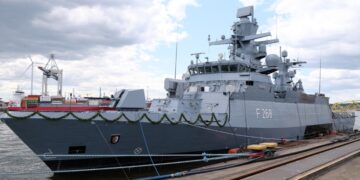In future, every soldier, every sensor and every effector will be digitally connected with each other in order to control operations down to the last detail. But if the network fails, mission tactics will determine success.
The term Multi-Domain Operations (MDO) is currently on everyone's lips, with the US armed forces summarising it in their Joint All-Domain Command and Control (JADC2) strategy and the British armed forces calling the corresponding concept Multi-Domain Integration (MDI). Within NATO, the Alliance Approach to Multi-Domain Operations is currently being developed by Allied Command Transformation in cooperation with Allied Command Operations.
Put simply, the US concept integrates the traditional domains of sea, air and land with the new domains of cyber and space, while the British concept also links the military options for action ("military instrument of power") with those of the other instruments of power (domestic, foreign, economic policy, etc.). For NATO, such an approach would mean conceptually and technically integrating the more than 100 armed forces of the 30 member states, which could probably never be realised. In this respect, NATO's approach to multi-domain operations is different.
Access?
- Access to all articles from the marineforum magazine
- Easy payment via PayPal, direct debit or credit card
- The subscription can be cancelled at any time free of charge
- Free of charge for MOV members












Thanks to Karsten Schneider for his clarifications and affirmations. Sometimes we lose sight of the actual management culture because of all the IT.
Thanks to Andreas Uhl for another great article. I was initially a little confused by the introduction when I read "But if the network fails, the order tactics determine success."
Fortunately, the text makes it clear that "leading with a mandate" does not only apply when the network is down. The belief - and for some, the hope - that with total networking it will finally be possible to lead centrally and no longer have to delegate responsibility is as old as there are reasonably modern means of communication. Even when Link-11 was introduced into the fleet, there were two schools of thought. The centralists wanted to take all decisions themselves, while the decentralists wanted to continue to lead with orders based on an improved situation picture and exchange of information.
This dispute of faith later continued at the political level, where the leaders were given detailed instructions for action from home. The misleading image of the strategic lance corporal was suddenly in many people's minds.
Properly understood and used, modern management tools should not promote centralisation, but can rather facilitate local management.
Leadership is a mental achievement. If all decisions are made by just one central head, then the mental capacity of the many decentralised leaders is switched off. The overall result of a single person or a few people in the centre is inevitably worse than the combined performance of many local staffs, because the sum of their individual performances cannot be achieved in the centre.
The control centre does not have a better picture of the situation, it just sees other aspects that are more relevant to it than the leader on the ground. The best basis for decision-making is created when the situation reports are combined. Networking makes this possible without the decision having to be shifted to the control centre.
Networking also improves the opportunities for cooperative leadership. It speeds up communication between decision-makers and experts, whether in your own organisation or at home (reach back).
All in all, networking and modern leadership tools do not jeopardise the old and proven leadership principles, but on the contrary offer good opportunities to apply them even more effectively. Once the network fails, they ensure that the troops are not headless and lost.